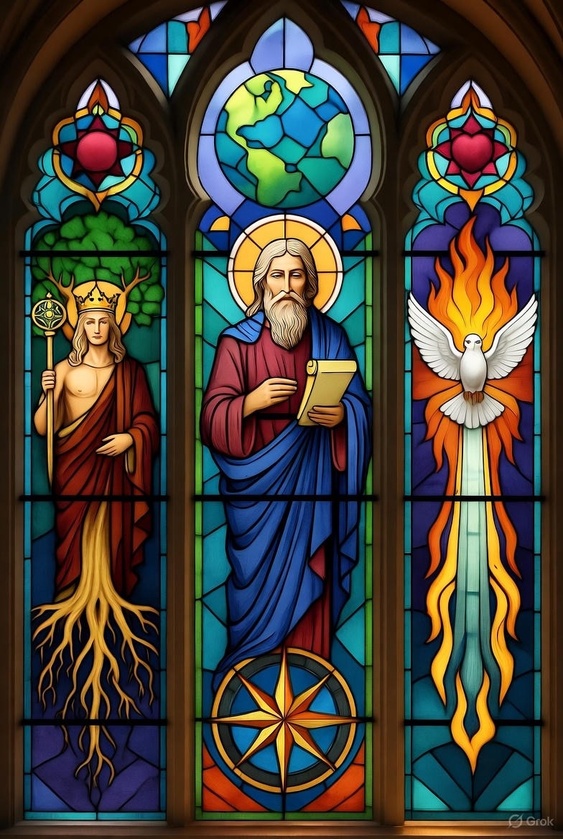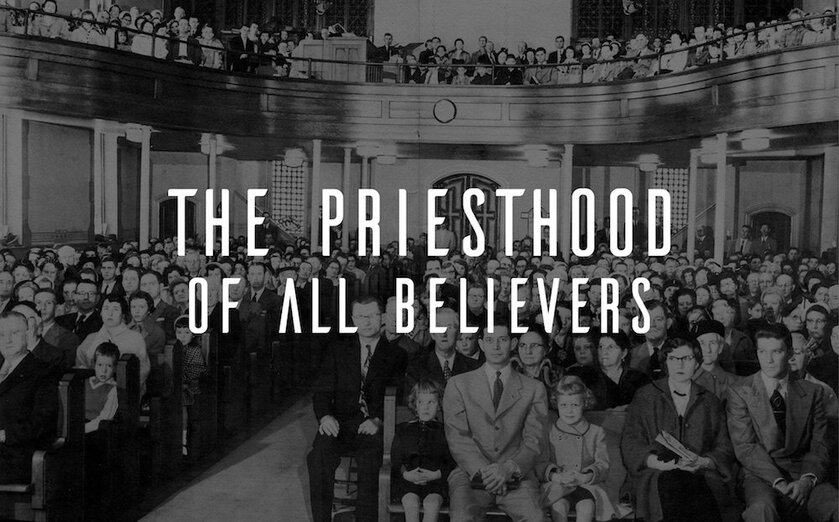Trinity Unveiled: Hope That Unites the Nations
Romans 15:8-13
For I tell you that Christ became a servant to the circumcised to show God's truthfulness, in order to confirm the promises given to the patriarchs, and in order that the Gentiles might glorify God for his mercy. As it is written,
"Therefore I will praise you among the Gentiles, and sing to your name."
And again it says, "Rejoice, O Gentiles, with his people."
And again, "Praise the Lord, all you Gentiles, and let all the peoples extol him."
And again Isaiah says, "The root of Jesse will come, even he who arises to rule the Gentiles; in him will the Gentiles hope."
May the God of hope fill you with all joy and peace in believing, so that by the power of the Holy Spirit you may abound in hope.
Paul weaves a tapestry of Old Testament voices, from Psalm 18:49, Deuteronomy 32:43, Psalm 117:1, Isaiah 11:10; stringing together these passages to celebrate the inclusion of the gentiles. Making Jesus Christ the God of all people. Paul is making the case that Christ’s servanthood bridges the unbridgeable. He confirms God’s faithfulness to Israel and extends His mercy to all the nations, fulfilling prophecy and shattering barriers. Israel’s covenants are honored; the nations are grafted in. Barriers of ethnicity, history, and sin crumble before the Servant-King. And the result? A unified chorus; Jews and Gentiles praising, rejoicing, and hoping together.
And it is this belief that binds these nations together in the hope that Christ brings. That hope abounds by the power of the Holy Spirit. And faith ignites joy and peace; the Spirit multiplies it until it overflows into every corner of life. This hope is not a fleeting emotion but a fortress built on what God has said and done. Feelings can be changed, but God's word is forever established and our hope is in that truth. Feelings rise and fall like tides, but God’s Word stands forever.
Isaiah 40:8
"The grass withers, the flower fades, but the word of our God will stand forever."
Christ’s finished work; His life, death, and resurrection, seals every promise. Belief in this truth ignites joy and peace; and the Holy Spirit fans it into flame until hope abounds spilling over into every sphere of life. In a divided world, this is revolutionary. Hope in Christ doesn’t merely coexist with differences, it transcends them. It binds hearts across cultures, generations, and grievances, because it rests on the unchanging God of hope.
I wonder if we today, so far removed from our first century father's in the faith, can truly understand the importance of what Paul is teaching here? Here we stand, two millennia removed from the dust of Roman roads and the tension of synagogue debates. Can we still feel the seismic shift Paul announces? To first-century Jews, God’s promises were their birthright; covenant, temple, Torah. To Gentiles, those promises were a locked door. Then Christ arrives; a Jewish servant who dies under Roman decree, rises, and flings the doors open wide. Paul insists, Look, here is the Father’s heart on full display.
This echoes the apostle Phillips plea,
"Lord, show us the Father" (John 14:8)
This wasn't some casual request, he wanted a theophany, a Sinai moment. And Jesus’ reply cuts deep:
"Whoever has seen me has seen the Father" (John 14:9).
He's saying the works of Christ; His servanthood, His cross, His inclusion of outsiders, are the revelation. Greater revelation than witnessing the Shekinah glory on demand. The promises confirmed to Israel? See the Father’s faithfulness. The Gentiles grafted in? See the Father’s mercy. The Spirit pouring hope into every heart? See the Father’s power.
How then is it that you haven't seen the Father?
The gospel isn't some simple footnote to the Old Testament; it is the unveiling. Every quoted psalm and prophecy becomes a spotlight on Jesus. You want to see the Father? There He is, the Root of Jesse, Jesus Christ, ruling the nations in hope, indwelling the people of faith through the power of the Holy Spirit.
This isn’t abstract theology. It’s revelation in motion:
A castaway finds welcome in a local church, there is the Father.
A prodigal is embraced without probation, there is the Father.
Joy and peace flood a divided small group, there is the Father.
Pharisees like Paul, Samaritans and Romans, eat at one table, there is the Father.
And today this Word from God still convinces us that our "outsiders" belong among the forgiven. God’s character is revealed when these barriers fall in Christ. Today we lack much of the cultural sting of Jew-Gentile enmity, but we know our own walls; politics, race, ideology, even church traditions. But The same Spirit who convinced the known world in the first century is still at work in us.
The same Spirit who melted hearts in Antioch, Corinth, and Rome is still at work. He doesn’t need cultural proximity, He needs surrendered hearts. When we obey the gospel’s call to welcome, to forgive, to hope, the Father is seen again.
Paul’s logic is airtight: If Christ is the Servant who confirms and extends God’s promises, and if the Spirit pours hope into every believing heart, then every act of unity in Jesus is a fresh portrait of the Father. The Trinity is on full display here, it is Trinitarian to the core.
1. The Son: Christ, the Servant, confirms the promises to the patriarchs and extends mercy to the Gentiles. He is the Root of Jesse, risen to rule. In His flesh, the Father’s faithfulness and love are made visible.
2. The Spirit: The Holy Spirit pours hope into every believing heart; Jew, Gentile, near, far, until it abounds in joy and peace. He is the power that makes unity live, not just theorized.
3. The Father: The God of hope orchestrates it all; His plan from Abraham to the nations, His character revealed when outsiders become heirs in His family.
Every act of unity in Jesus is a fresh portrait of the Father, because it is the Trinity at work.
This is no cold doctrine. This is revelation in 3D:
The Father plans,
The Son fulfills,
The Spirit applies, and the world sees God.
Done and done. The promises stand confirmed. The nations are welcomed. Hope abounds.
But the portrait isn’t finished.
It’s still being painted today,
in your words, your welcome, your refusal to walk away.
Done? Yes in Christ.
Done in us? Only as we live it.
Prayer
Triune God, Father of hope, Servant-Son, Life-giving Spirit, display Yourself in us.
Let every embrace, every shared table, every forgiven offense
be a canvas where You paint Your unity.
Make our churches, homes, and hearts, living icons of the Trinity.
Amen.




















